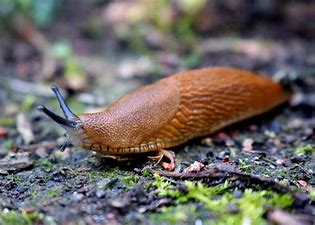
Controlling slugs without chemicals
Slugs are everywhere. Whilst they eat holes in leaves, stems, flowers, tuners and bulbs, at this time of year they love nothing better than munching on herbaceous new growth. Let’s see how we can control slugs without the use of chemicals.
Read the signs
-
Slime trails seen as a silvery deposit
-
Irregular holes in plants
-
Visible on wet days and through the night
Control
You’ll rarely eradicate slugs, so some damage has to be tolerated. However concentrate your efforts on vulnerable plants, seedlings and soft shoots.
There’s a biological control known as ‘nemaslug’ which won’t affect other animals. It is simply watered into the soil and the slugs are infected with a bacteria which causes a fatal disease. The soil needs to be moist and above 5 ºC, which means spring is the best time. Heavy soils don’t respond well as the ‘nemaslug’ needs to penetrate. So if you have clay soil, it might be worth exploring other control methods.
Torchlight searches on mild evenings, especially when the weather is damp; hand-picking slugs into a container. They can then be taken to a field, hedgerow or patch of waste ground well away from gardens, or killed in the freezer before being added to the compost heap or put in the bin
Disposable plastic drinks bottles, with the bottoms cut off and the screw tops removed, make excellent individual protective cloches for young transplants. Check for the first few days after transplanting that a slug hasn't been trapped inside the bottle.
A slug and snail tape that creates a protective barrier is now on the market. Slugs are repelled by the small electric charge naturally contained in the copper face. Being self-adhesive, it is easy to fix onto pots, seed trays, garden furniture, even onto sturdy plants.
SAS slug and snail repellent contains a natural yucca extract. When sprayed on the ground it forms a physical barrier which slugs and snails will not cross. As with many other repellents, it will withstand light rain, but will have to be renewed after a heavy downpour.
All sorts of materials such as lime, forest bark, crushed eggshells, wood ash, human hair and soot are said to make effective slug barriers, sprinkled on the ground around plants. The idea is that the barrier either dries out the slime that the slugs move on or that it irritates them so they will not cross it. Their effectiveness must inevitably be weather dependent but they may be worth trying, especially under cloches. Make a smooth seedbed type surface before applying a good layer of the material, a few inches wide.
More information
> Royal Horticultural Society
> RSPB Slug Facts

Measure My Lawn Online
Want a guideline price to cut your lawn?
Get an indicative price to cut your lawn without even stepping outside to measure your lawn. Don't forget though - we offer so much more than simply grass cutting. We're passionate about offering the full garden maintenance package. Let us keep your garden looking simply amazing all year round.
GET STARTED
Jobs for this month
Spring usually arrives by mid-March and the frequent sunny days provide the opportunity for an increasing range of gardening tasks. It's time to get busy preparing seed beds, sowing seed, cutting back winter shrubs and generally tidying up around the garden.
SEE MORE

Punctual & friendly
Darren and his colleague transformed our scrappy, lumpy garden into a beautiful lawn! They were punctual, friendly and got on with the job with no bother.